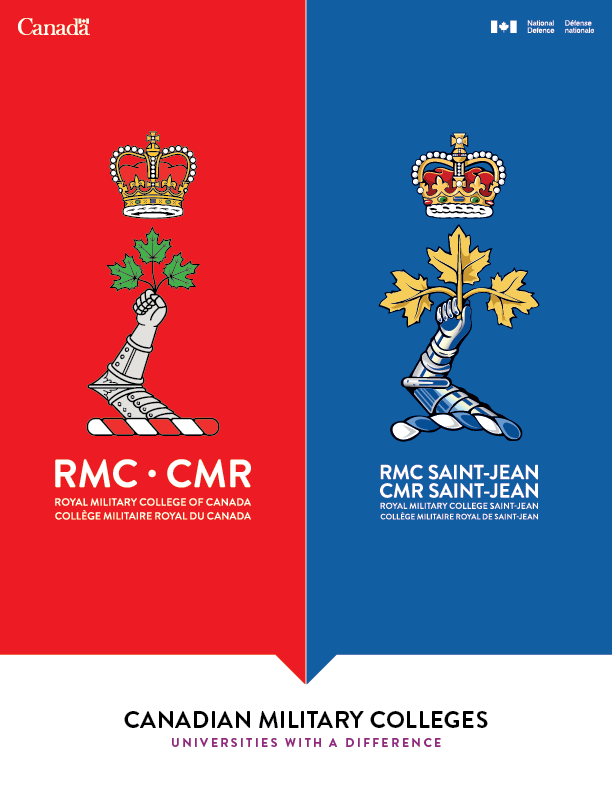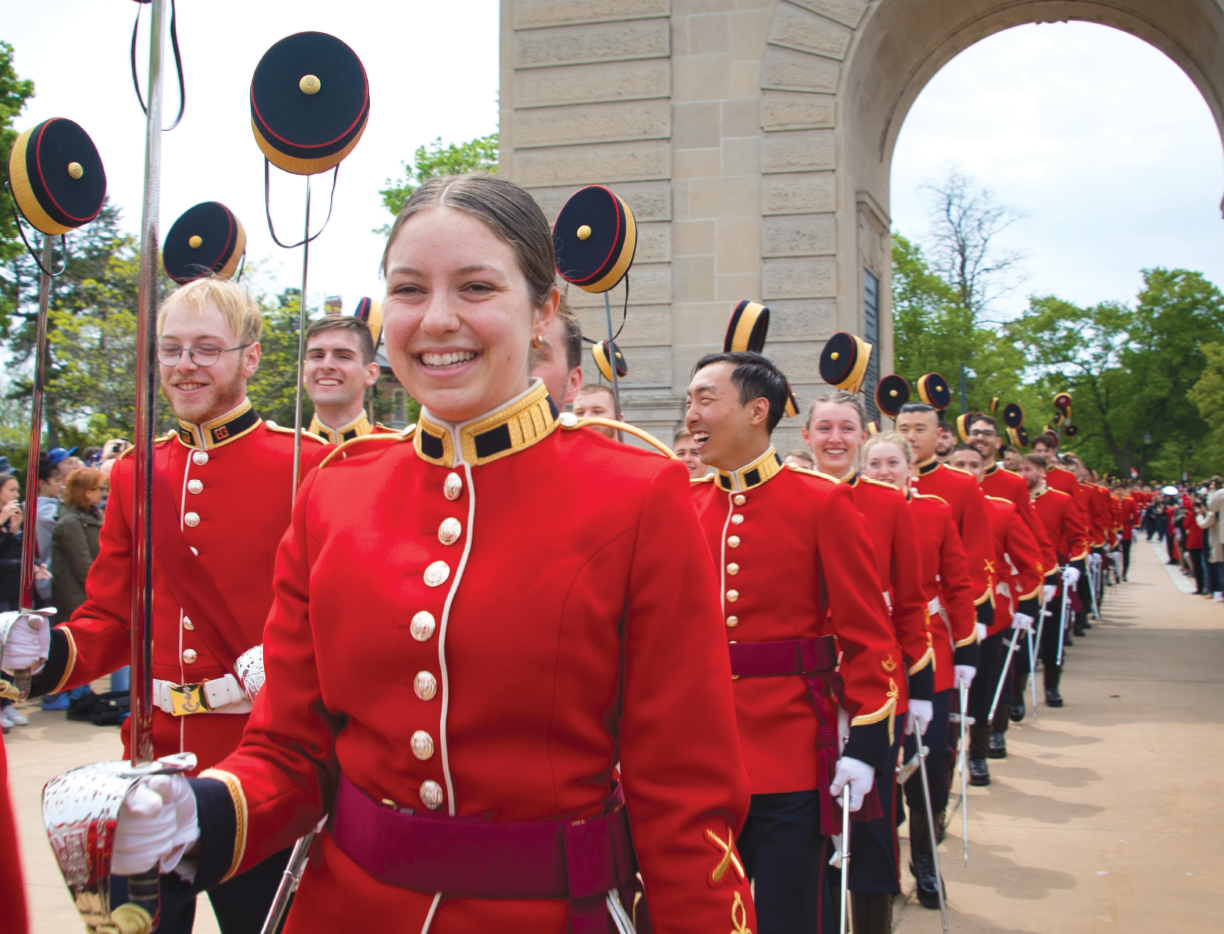
Table of Contents
- Universities with a difference
- The Four Pillars of Achievement
- Naval and Officer Cadet Life at RMC
- Naval and Officer Cadet Life at RMC Saint-Jean
- Social Sciences and Humanities Programmes
- Engineering Programmes
- Science Programmes
- Admissions
- How to apply
- Academic prerequisites by Province/Territory
- Military Occupations vs Academic Programmes
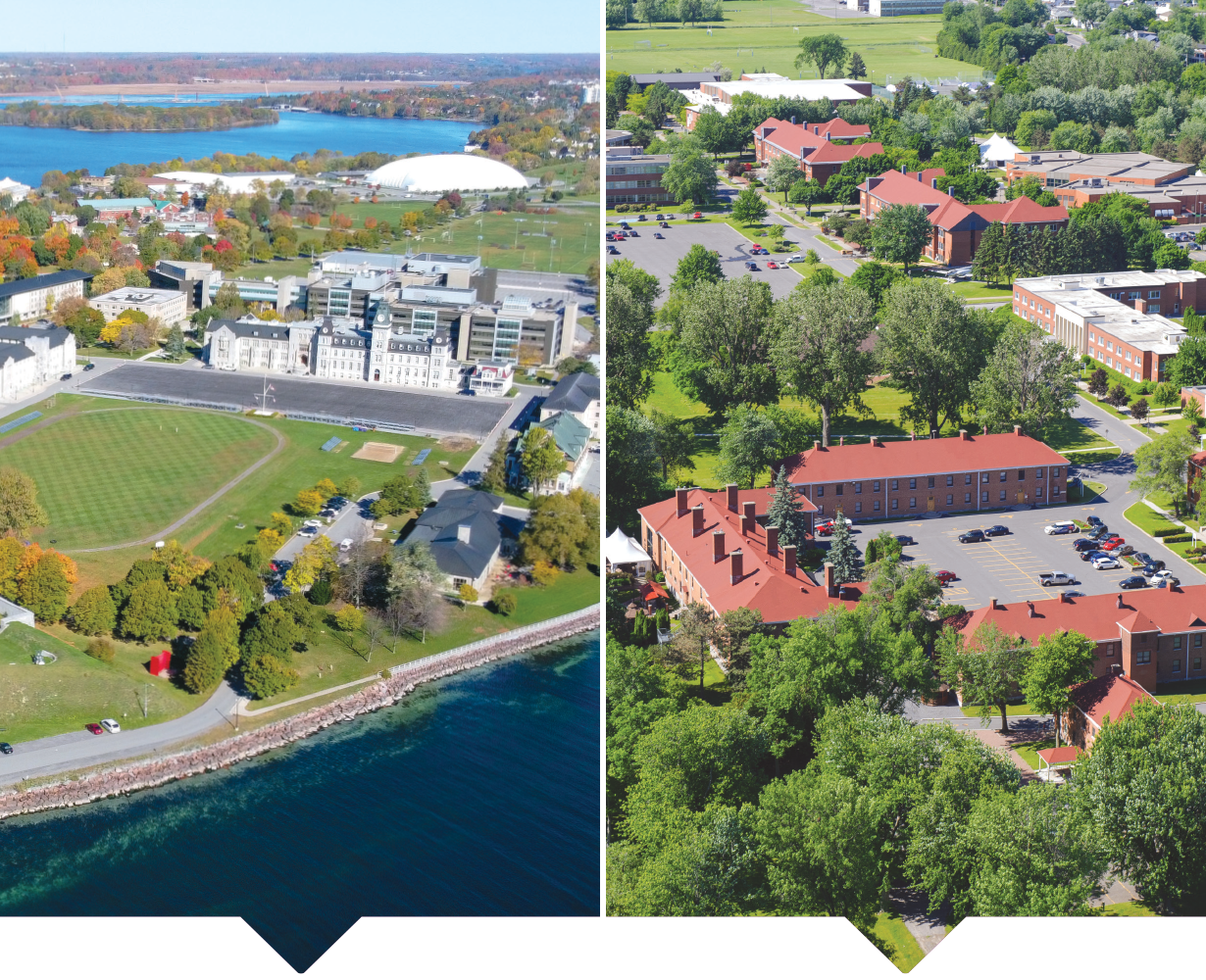
Royal Military College of Canada
Kingston, Ontario(613) 541-6000 ext. 6984 CSN: 271-6984
liaison@rmc-cmr.ca
1-866-762-2672
RMC is located on the traditional homelands of the Hodinöhsö:ni, Anishinaabek, and Huron-Wendat Peoples. We recognize their strength and wisdom; their stewardship of the land and water, the plants and animals. Together let’s commit to learning about, and learning with, Indigenous Peoples and honouring the Nation-to-Nation relationships Canada continues to build with Indigenous Nations, from sea to sea to sea.
Royal Military College Saint-Jean
Saint-Jean-sur-Richelieu, Quebec(450) 358-6777
ol-cmr@cmrsj-rmcsj.ca
1-844-842-2008 option 1
RMC Saint-Jean acknowledges that the land on which it is located is where the traditional territories of several Aboriginal nations meet, including those of the Waban-Aki Nation and of the Mohawk Nation.
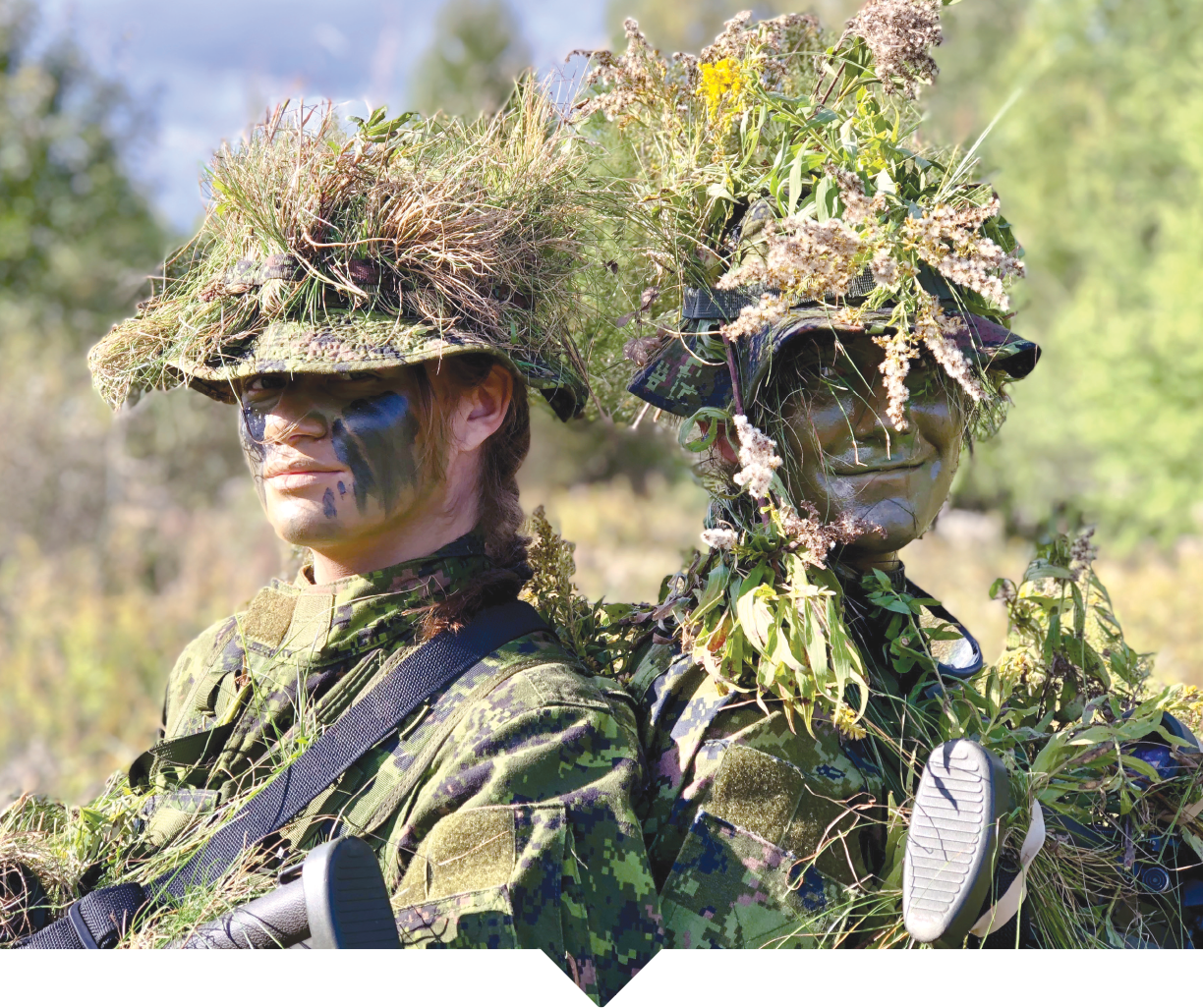
UNIVERSITIES WITH A DIFFERENCE
Both Canadian Military Colleges (CMCs) — the Royal Military College of Canada (RMC) in Kingston, Ontario, and Royal Military College Saint-Jean (RMC Saint-Jean) in Saint-Jean-sur-Richelieu, Quebec, are two complementary military universities with a difference.
The CMCs offer, amongst other programmes, the Regular Officer Training Plan (ROTP) — a fully subsidized education plan leading to an undergraduate degree and a commission as an officer in the Canadian Armed Forces (CAF).
The CMCs are bilingual institutions where Naval and Officer Cadets can choose to take courses in either French or English and daily activities can take place in one or the other official language, or both. This environment allows tremendous linguistic opportunities.
As a ROTP Naval and Officer Cadet (N/OCdt) at a CMC, you will embark on an invigorating journey to become a part of a proud heritage. N/OCdts are enabled to excel by being immersed in an environment that values excellence in academics, military training, physical fitness, second language proficiency and leadership. The CMC environment cultivates self-discipline, self-motivation and mutual respect, and the Colleges Motto — Truth, Duty, Valour — guides staff and N/OCdts in everything they do.
The education and military experience within the CMCs will provide you with the professional and intellectual skills necessary to assume the responsibilities and meet the demands of leadership in today’s rapidly changing world. A career as an officer of the CAF will offer you experiences and challenges, serving Canada across the country and around the globe.
THE FOUR PILLARS OF ACHIEVEMENT

ACADEMICS
Studies are at the heart of officer training. The academic programme emphasizes the practical applications of what has been learned to military settings and daily operational demands. All CMC N/OCdts will complete a degree in the Faculty of Social Sciences and Humanities, Engineering or Science.
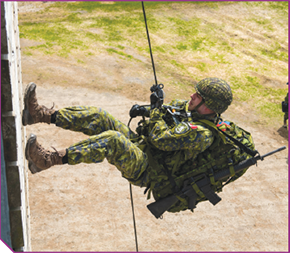
MILITARY
The military pillar develops skills needed by officers to succeed in today’s complex and rapidly changing world. Upon completion of the Basic Military Officer Qualification (BMOQ) training, given at the Canadian Forces Leadership and Recruit School (CFLRS), N/OCdts accepted at one of the CMCs will continue learning the elements of military training during the Colleges’ Orientation Programme.
N/OCdts are given the opportunity to hold leadership positions while at the Colleges and are mentored by military staff and senior N/OCdts.
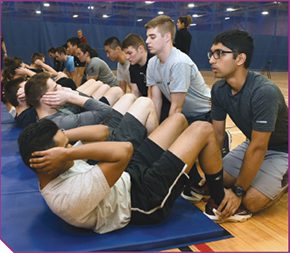
PHYSICAL FITNESS
The CMCs teach the importance of fitness and a healthy lifestyle. The Physical Education and Athletics Programme helps each N/OCdt attain a high level of physical fitness and learn the skills in a wide variety of team and individual sports. This programme is an integral part of the curriculum. The N/OCdts must meet the CMC fitness standards in order to graduate.
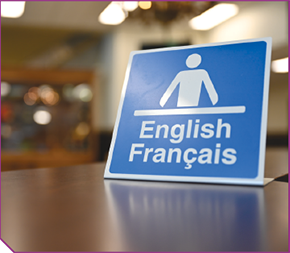
BILINGUALISM
Bilingualism reflects Canada’s heritage. As representatives of this heritage, officers are expected to be fluent in both of Canada’s official languages. Upon arrival at a military college, N/OCdts complete a second language proficiency evaluation. For second language classes the N/OCdts are grouped in small classes according to their level of bilingualism. Four hours per week of second language training is mandatory up until they achieve a BBB level recognized by the Public Service Commission.
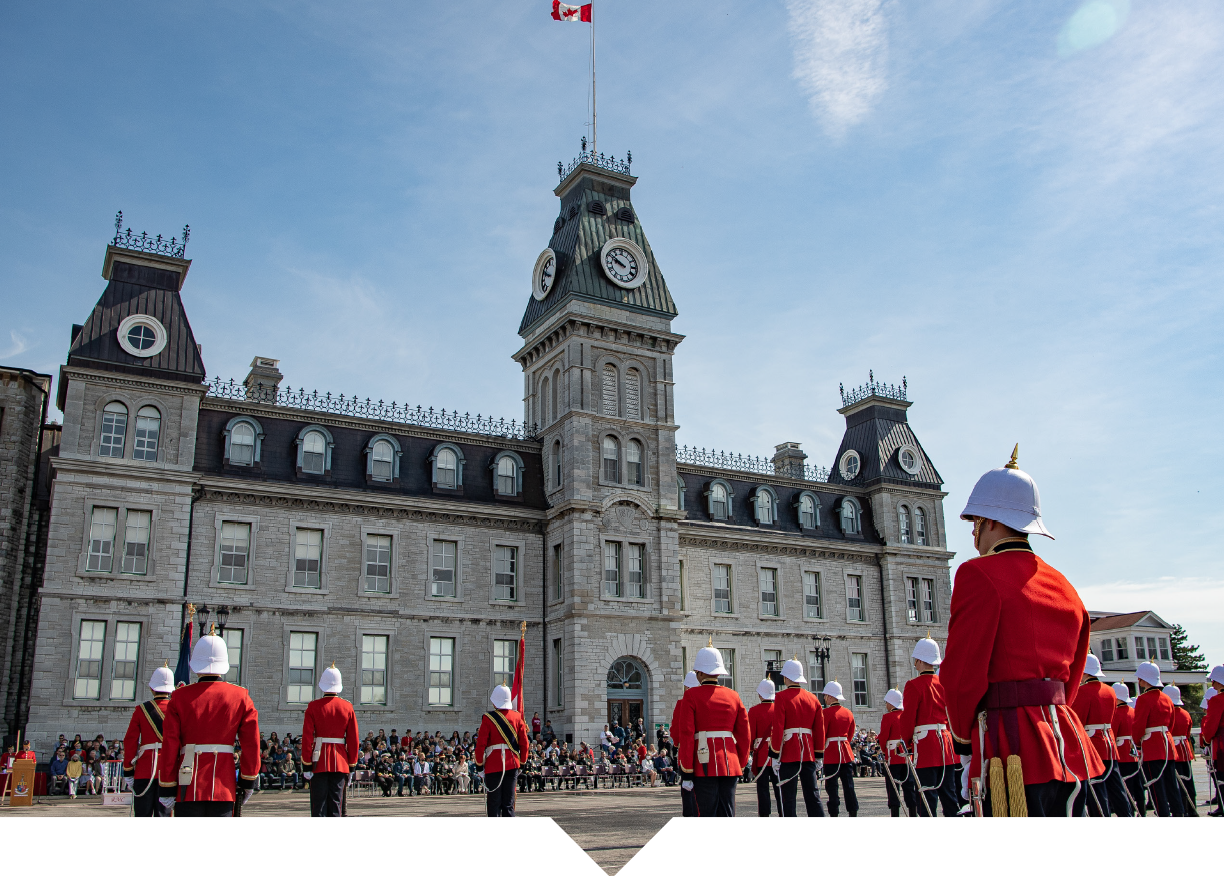
NAVAL AND OFFICER CADET LIFE AT RMC
KINGSTON CAMPUS
The campus, rich in history, heritage and tradition, is located on Point Frederick, a small peninsula near downtown Kingston, Ontario, situated midway between Toronto and Montreal, and only two hours from Ottawa.
RESIDENCES
N/OCdts are required to live on campus, at their expense, via an automatic deduction from their pay. Available single rooms are normally allocated to Fourth Year N/OCdts or accordingly to their responsibilities. Other N/OCdts are quartered in double rooms. Residences are co-ed.
VISITING RMC
Undergraduate applicants and their families are encouraged to participate in a tour of RMC. Tours are offered throughout most of the year and reservations are required. Contact liaison@rmc.ca or call toll free 1-866-762-2672 or 613-541-6000 ext. 6984 to schedule your campus tour.
ATHLETIC FACILITIES
RMC’s athletic facilities cater to a wide variety of sports and activities. The Kingston Military Community Sports Centre houses a 25-metre pool and hot tub, a 200-metre track, a spin room, cardio room, squash courts, a weight room and several gyms. There are also soccer fields, rugby pitches, an ice rink, a domed turf field, a beach volleyball court, and an ample amount of equipment that provide N/OCdts with the opportunity to participate in water sports, including windsurfing, stand-up paddle boarding, canoeing and kayaking, and a variety of activities.
SPORTS & RECREATION
RMC is a member of the Ontario University Athletics (OUA), one of four conferences that make up U SPORTS. RMC’s varsity teams compete in a variety of sports, as shown below.
RMC’s competitive clubs provide members an enhanced opportunity for training and competition that are otherwise not available as recreational clubs.
N/OCdts who are not members of a varsity team or competitive club participate in the intramural programme and may be involved in organizing and running intramural events.
For more information, and to see a full list of intramural sports and recreational clubs available, please visit www.gopaladinsgo.ca.
COMPETITIVE CLUBS
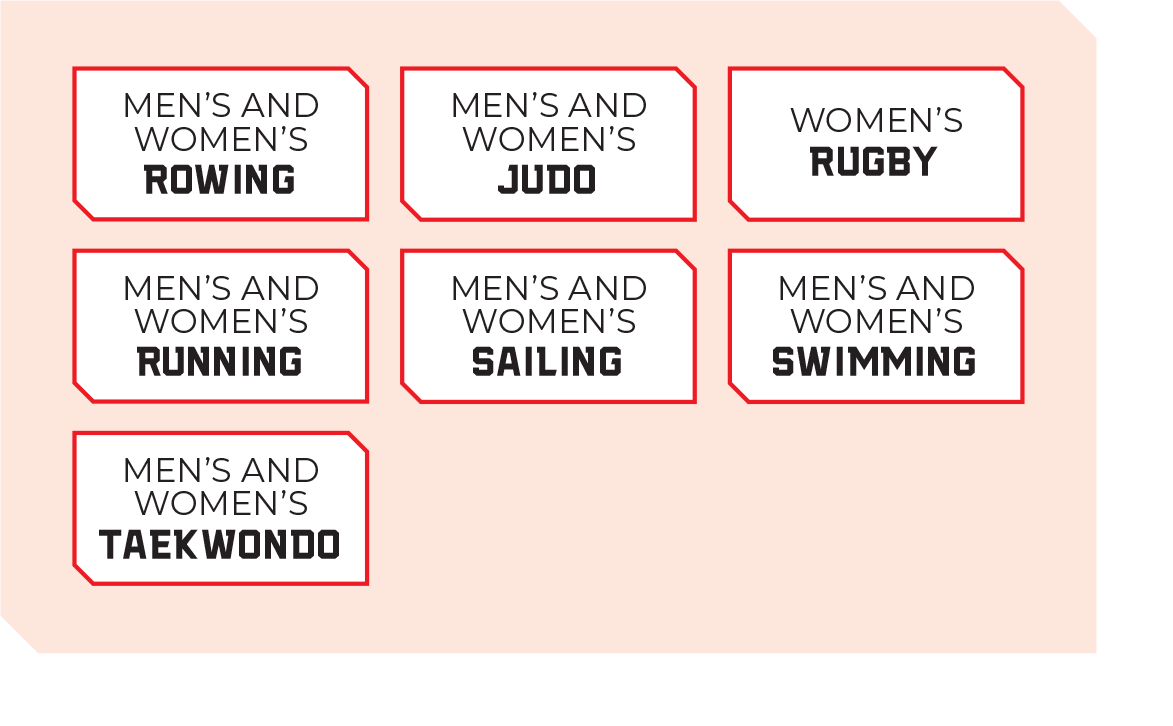
VARSITY SPORTS
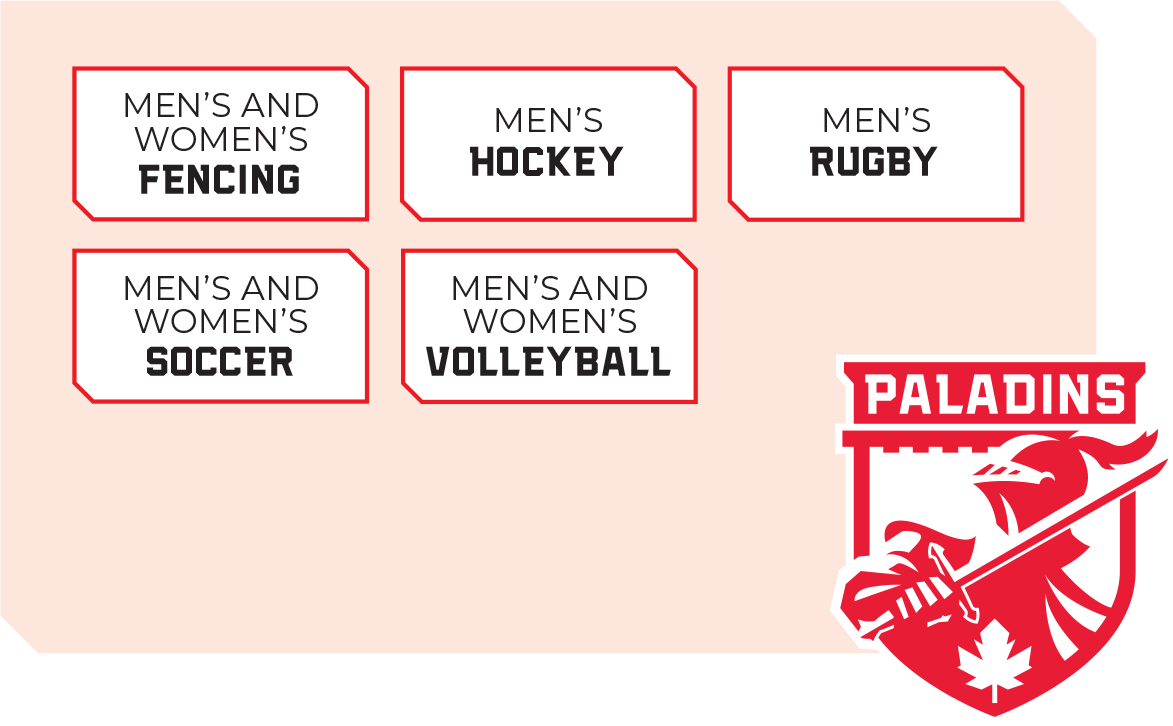
STUDENT SERVICES
The Royal Military College of Canada (RMC) is dedicated to ensuring the inclusion, advancement and success of the four federally designated groups (FDGs) and other traditionally disadvantaged groups within our university.
To ensure a strong Principles of Equity, Diversity and Inclusion (EDI) framework, RMC established the institutional EDI Committee in 2020. The EDI Committee recognizes that there are gaps within this diverse group (particularly in terms of representation of Indigenous peoples and persons with disabilities). Thus, the EDI Committee is currently filling these gaps by ongoing consultations with representatives of equity seeking groups.
RMC recognizes the important role of the AGORA 2SLGBTQIA+ support group, the ATHENA network and the Indigenous Knowledge and Learning group supporting and promoting an inclusive work and study environment for FDGs at RMC.
As part of a recent large renovation project, RMC established gender-neutral washrooms and change areas.
Delivery of student support services is accomplished via the cooperative efforts and partnerships of many internal and external organizations that are capable of acting as the first point of contact, and help N/OCdts either directly, or by referring them to appropriate resources. N/OCdts can walk into the RMC Success Centre for any reason to find support and help.
N/OCDTS HAVE ACCESS TO THE FOLLOWING SERVICES:
- RMC Success Centre
- Math Help Centre
- Writing Centre
- Academic Accommodations
- Sentinel Programme
- Spiritual Support and Prayer Rooms
- Medical and Dental Services
- Canadian Forces Morale and Welfare Services
- Military Family Resource Centre
- Personnel Support Programmes
- Financial Counselling Services
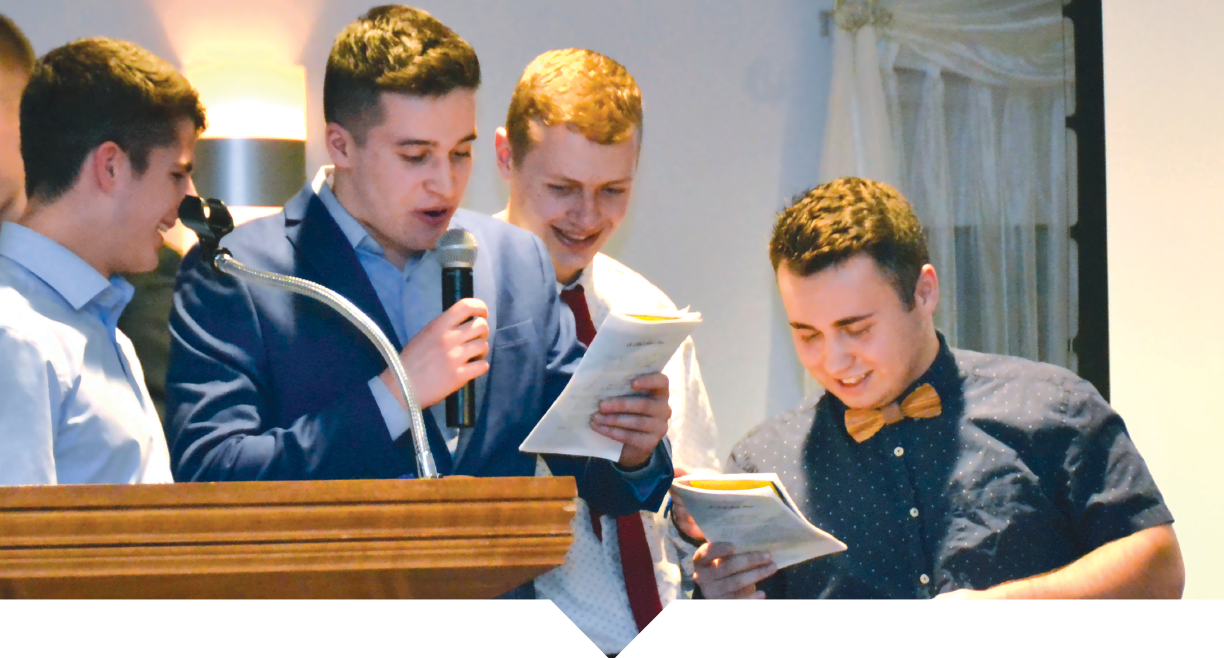
NAVAL AND OFFICER CADET LIFE AT RMC SAINT-JEAN
RMC Saint-Jean ensures N/OCdts a seamless transition from high school to university by providing two college-level programmes in Social Science and Science, which are closely integrated with the undergraduate university programmes offered at both CMCs.
These two-year pre-university studies are offered in both official languages; they extend over four semesters and correspond to CEGEP 1 and 2. The courses are recognized by the Ministry of Higher Education of the province of Québec. If the N/OCdt does not fail a course during these four sessions, he/she or they will obtain a diploma of college studies (DEC).
RMC Saint-Jean also offers an undergraduate programme in International Studies.
SAINT-JEAN CAMPUS
The RMC Saint-Jean campus is set on a historical site located on the west bank of the Richelieu River, some 40km southeast of Montreal and only three hours from Kingston, ON. Athletic and recreational facilities, along with dining facilities are all located a few steps away from academic facilities and N/OCdts residences.
RESIDENCES
All N/OCdts are required to live on campus at their expense, via an automatic deduction from their pay. Residences are co-ed, and they have shared bedrooms and bathrooms for people who identify with the same gender. Laundry rooms and a lounge are available in each residence.
ATHLETIC FACILITIES
RMC Saint-Jean’s athletic facilities provide N/OCdts the opportunity to participate and compete in many different sports. The sports complex includes a 25 yards pool, a spinning room, a weight room, a cardio room, squash courts, an ice rink and hardwood courts. Outside tennis courts, soccer fields, deck hockey and a 400-metre track are also available. All necessary equipment is made available to train and develop the N/OCdts athletic abilities.
SPORTS & RECREATION
RMC Saint-Jean is a member of the Quebec Student Sports Network (RSEQ), one of the four conferences that make up the U SPORTS organization. RMC Saint-Jean varsity sports participate in a variety of competitions.
RMC Saint-Jean Competitive Sports provide their N/OCdt athletes better opportunities to train and compete that they would not otherwise have access to through recreational clubs. N/OCdt athletes who are members of a competitive team represent RMC Saint-Jean in civilian and military events.
N/OCdts who are not members of a varsity team or competitive sport must participate in the intramural programme and may be called upon to take part in the organization and supervision of these.
Maintaining a healthy lifestyle is a priority for the CAF and this is why physical fitness training and sports are a mandatory part of N/OCdt life. The sports programme will develop values such as resilience, determination, respect and team spirit in a stimulating environment, with the support and guidance of strong leaders.
N/OCdts may choose to play in competitive teams or intramural sports. The competitive sports component of the programme offers a calendar of events adapted to each discipline that provides N/OCdts with opportunities for success and excellence. Some leisure clubs are also available, such as fencing, boxing training club, broomball, airsoft, cycling and reading. These clubs may change based on students N/OCdts different interests.
COMPETITIVE SPORTS
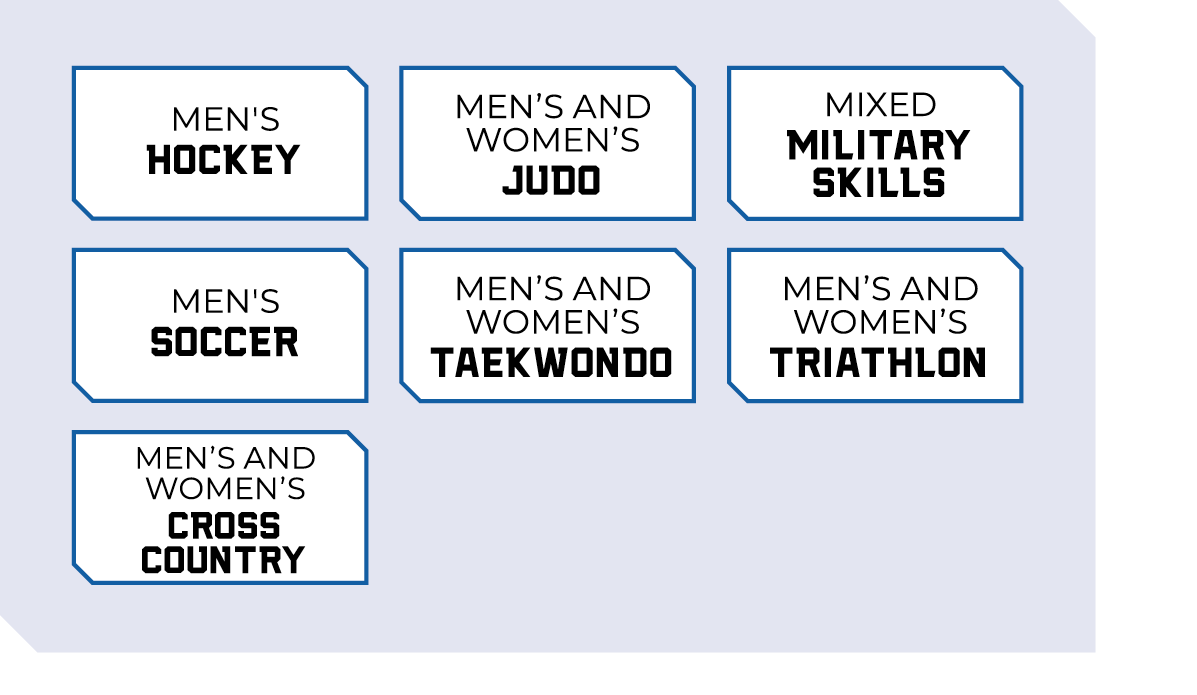
UNIVERSITY SPORTS
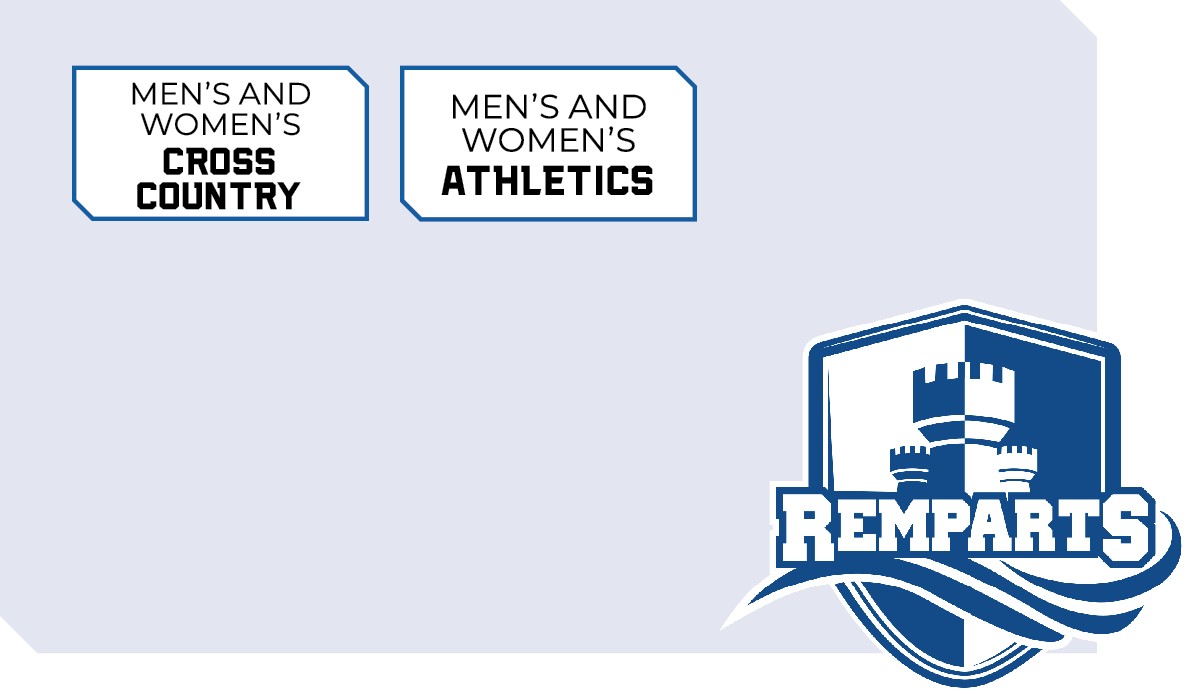
SPORTS PARTNERSHIP
The sports department of RMC Saint-Jean, to maximize and expand its service offer, has a partnership with the sports department of Cégep de Saint-Jean-sur-Richelieu via www.cstjean.qc.ca.
STUDENT SERVICES
To support N/OCdts along their studies and to ensure their success in each of the four pillars of the CMC, RMC Saint-Jean offers a variety of services designed to help them cope with the many challenges they face at the academic, moral, as well as physical and mental health levels.
Upon arrival at RMC Saint-Jean, an experienced military team mentors all N/OCdts. This team will allow them to learn the ways of the military culture in a healthy and respectful environment.
Personnel Support Program staff work with the military community and several partners to promote the moral and physical well-being of military personnel in their communities. This includes healthy eating and physical fitness programmes provided by the kinesiology team at RMC Saint-Jean. The N/OCdts also have access to the Peer Support Group. Members of this group focus on active listening to direct their peers to resources and support services as needed.
N/OCDTS HAVE ACCESS TO THE FOLLOWING SERVICES:
- Mentorship by experienced military personnel
- Members of the Personnel Support Program
- Peer Support Group
- Chaplains and spiritual guidance
- Pedagogical expertise cell (pedagogical support and advice, accommodations, etc.)
- Director of College Programmes
- Documentary Research Support & Training
- Peer Tutoring Services
SOCIAL SCIENCES AND HUMANITIES PROGRAMMES
BA (Honours) or BA - Double Honours, Majors and Minors are possible
www.rmc-cmr.ca/en/faculty-social-sciences-humanities
BUSINESS ADMINISTRATION
The Business Administration programme delves into accounting, information systems, finance, marketing, operations management, data analytics, business ethics, and human resource management. Business administration does not take place in a vacuum. Understanding the environmental context and its relationship with the functional areas of management is essential to the development of effective decisions, policies and strategies. The programme also exposes N/OCdts to associated disciplines such as economics and psychology due to their close relationship to the field of management.
ECONOMICS
Economics is how individuals, firms, and governments make choices about allocating resources to satisfy needs. There are two main branches of economics: microeconomics and macroeconomics. Microeconomics studies the behaviour of individual decision makers such as firms and households. Macroeconomics is concerned with the behaviour of the economy as a whole and, in particular, with factors such as unemployment, national income, and economic growth, inflation, and price levels.
ENGLISH, CULTURE AND COMMUNICATION
The programme is designed to develop and refine communication skills and enhance problem-solving abilities. The programme explores both traditional and non-traditional values in societies with a view to enhancing critical thinking and insight from the study of literary culture and language and the influence of these values on economics, politics and history.
FRENCH LANGUAGE, LITERATURE AND CULTURE
The programme is designed to improve the N/OCdts’ communication skills, by thinking critically about and analyzing Francophone literature. N/OCdts gain an understanding of cultural values in the development of the contemporary world, with particular emphasis on “La Francophonie”. The programme also investigates how sociocultural standards vary from one society to another.
HISTORY
History has been described as one of the best possible educations for military leaders, short of actual battlefield experience. The programme places considerable emphasis on the study of international relations, civil-military relations, and the impact of war on society. It provides exposure to the study of the histories of Canada and many other regions and countries around the world. Specialized thematic courses are also available.
MILITARY AND STRATEGIC STUDIES
This programme employs a multidisciplinary approach to the study of international relations, strategic thought and military history, through a combination of core courses in history, political science and psychology. This programme provides a foundation for those who intend to pursue careers in the areas of international relations, defence and security studies.
POLITICAL SCIENCE
Canadian government and international relations are core courses for all cadets. Political science is multidisciplinary including electives in economics, history, and psychology. Students select from courses about methods, philosophy, theory, law, comparative politics, administration, conflict, democracy, justice, and equality, organized in three streams – Canada, the World, and Advanced Topics. Simulations, internships, and off-campus study are normal for strong students.
PSYCHOLOGY
The programme provides N/OCdts with a framework on which to build an understanding of the dynamics of leadership. Emphasis is on the military experience. Focusing on self-awareness and appreciation of human behaviour; the ability to understand and apply influence in social situations; the skill to adapt leadership approaches to a variety of circumstances; and an appreciation of the necessity for personal integrity, the importance of human dignity, and the need to reflect continually on one’s values and professional conduct.
INTERNATIONAL STUDIES *
* The International Studies programme is only offered at RMC Saint-Jean
www.cmrsj-rmcsj.forces.gc.ca/ea-cs/ac-cc
RMC Saint-Jean offers an undergraduate programme in International Studies. This multidisciplinary programme aims at preparing N/OCdts of some occupations for the responsibilities awaiting them in their career in the CAF, where they will have the opportunity to serve at the international level and work in a variety of culturally diverse environments.
International Exchanges
Some N/OCdts will have the opportunity to develop an enriched expertise through international study trips and possible participation in semester-long international exchanges at one of six partner military universities located across the globe.
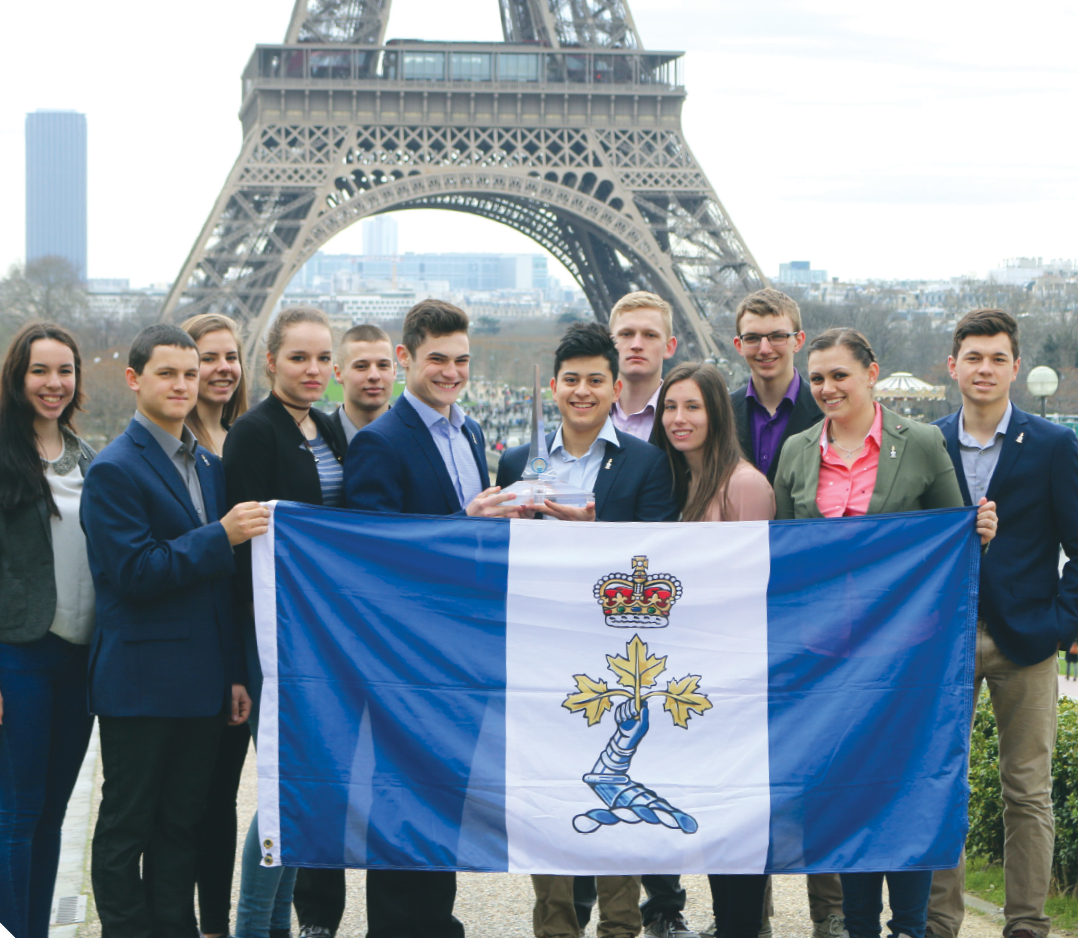
ENGINEERING PROGRAMMES
BEng.
www.rmc-cmr.ca/en/faculty-engineering
AERONAUTICAL
Developing vehicles and systems for atmospheric and space environments, Aeronautical Engineers have a thorough knowledge of aerodynamics, fluid dynamics, propulsion, aircraft performance, structures, materials, flight dynamics, control and navigation systems, and avionics. Working with highly interrelated systems, they understand all aspects of the project that make up the design of an air vehicle. Venturing into state-of-the-art technologies, they explore all possibilities to allow people and machines to travel faster and farther, or indeed more slowly, securely, stealthily, lethally or effectively both in the atmosphere and in space.
CHEMICAL
The programme has a strong materials engineering and chemical process design components. Nuclear and Environmental Engineering are also included to reflect the spectrum of chemical engineering interests valuable to the CAF and DND. In addition to the Chemical Engineering core courses, the programme places emphasis on the areas of corrosion, fuel cells, batteries, alloys, polymers, ceramics, composite development, explosives, combustion processes, nuclear energy applications, renewable products, and environmental stewardship. The programme also highlights the contribution to sustainable development.
CIVIL
Civil Engineers apply their scientific and technical knowledge to analyze, design, operate, manage, maintain, and decommission bridges, roads, buildings, retaining walls, water and wastewater treatment plants, aqueducts, sewers, and all other infrastructure. They participate in environmental assessments and the development of standards and designs for current and future climates, from polar to arid or tropical regions. Courses in the field of structures, soil mechanics, water resources, transportation, and geomatics, are complemented by other topics of relevance to the Military Engineers trade. A programme highlight is a one-week field school at a Canadian or international location in Third Year.
COMPUTER
Computer Engineering includes the design of the software, hardware, and network communications aspects of computing systems. Starting from simple concepts in programming, digital logic, and electronics, RMC’s programme progressively builds skills until graduates are able to design complete computer systems, including processors, memory, peripherals, operating systems, applications, and networks. The programme has a strong emphasis on Cyber Security, culminating in a week-long exercise in which N/OCdts design and secure an operational network and defend it against professional attackers. An electronics option is also available.
ELECTRICAL
The discipline involves knowledge of the theories and principles of mathematics, science, electronics and engineering to develop an understanding of analog, digital, control and electromagnetic/optical design principles. N/OCdts studying within the programme will build their knowledge of one of the following streams: Power and Control, or Communications and Electronics. Electrical Engineers are involved in the development of smart grids for the delivery of reliable energy, advanced telecommunications networks, and the development of electric vehicles and robotics.
MECHANICAL
Mechanical Engineers are innovators, focusing on the analysis, design, manufacturing and maintenance of items of all sizes, which extend human physical abilities, from nano-machines to large manufacturing plants. With a solid understanding of mechanics, kinematics, thermodynamics, fluid mechanics, materials science, control systems, and energy, they possess problem-solving skills, which are required to tackle today’s technical problems. They work in a team environment, with solid leadership and communications skills, in all levels of industry, public service and military organizations.
SCIENCE PROGRAMMES
BSc (Honours) or BSc - Double Honours, Majors and Minors are possible
www.rmc-cmr.ca/en/faculty-science
CHEMISTRY
Chemistry provides a basic building block for a broad understanding of the world around us. The principles and chemical properties learned will pervade every aspect of one’s personal and professional life. The Department of Chemistry and Chemical Engineering offers a BSc in Chemistry covering fundamental aspects of the chemical sciences, with applications related to the military, nuclear science, the environment, and materials. N/OCdts also have the option to specialize in Life Sciences (courses geared towards chemical biology) Environmental Sciences and/or Chemical, Biological, Radiological and Nuclear Warfare (CBRN) by taking advantage of our three available Minors.
COMPUTER SCIENCE
Computing systems are increasingly vital in many fields of human activity, and their influence is continually expanding. This programme provides a good basis in math, programming skills, algorithm analysis, and computational complexity. It also covers courses in app development, networks, graphics, and artificial intelligence. A Computer Science degree ensures that graduates are well-prepared with the necessary skills and knowledge to fully leverage the many systems employed throughout the CAF.
MATHEMATICS
Mathematics forms the basis for numerous fields such as Science, Engineering, Finance, and Economics. The Mathematics programme offers a wide range of areas such as Probabilities and Statistics, Algebra, Cryptography, Analysis, Game theory and Data Analytics. A graduate with a Mathematics degree can directly apply this knowledge within the CAF in solving problems in areas that deal with logistics planning, constraint problems, war-gaming, and modeling used in operational and strategic planning.
PHYSICS
Physics intersects with many interdisciplinary areas of research, and its boundaries are not rigidly defined. Physicists make significant contributions through advances in new technologies that arise from theoretical and experimental advances.
The physics programme offers a wide range of courses addressing many aspects of the physical sciences, such as mechanics, classical and modern physics, as well as electromagnetism and optics. Many specialized courses are offered in senior years to cater to the various branches of physics. These courses are mainly related to the three axes of research within the Physics Department: acoustics and oceanography, materials science, and space science, which includes astronomy and astrophysics.
SPACE SCIENCE
The Space Science programme is a more specialized physics-based degree focused principally on topics related to space mission development and operations, space research and astronomy/astrophysics. In senior years, N/OCdts are required to complete advanced space-related courses, including orbital mechanics and space concepts and applications. In the Honours programme, N/OCdts take more specialized courses, including space communication and navigation, and physics of the space environment. N/OCdts in the Honours programme work as a team to complete a capstone project designing a realistic space mission.
ADMISSIONS
REGULAR OFFICER TRAINING PLAN (ROTP)
The ROTP gives young Canadians and Permanent Residents an opportunity to obtain both an officer’s commission in the Canadian Armed Forces (CAF) and an undergraduate degree. The aim of the ROTP is to develop selected young men and women as officers in the CAF in a variety of career occupations. Successful ROTP candidates enroll in the CAF as N/OCdts and attend the Royal Military College of Canada, the Royal Military College Saint-Jean or a Canadian Civilian University.
At the CMC’s, the Department of National Defence (DND) pays for all costs of tuition, uniforms, books, instruments, and other essential fees. N/OCdts are also paid a monthly salary (from which mandatory room, board and mess dues are deducted). They complete military occupation training and second language training during the summer months. They will also receive full medical and dental care at no cost. Annual vacation with full pay is according to CAF regulations.
CMC’s N/OCdts are required to maintain satisfactory academic, military, fitness and linguistic progression throughout the programme. Those who do not maintain a suitable level of academic performance may be permitted to repeat up to one year at their own expense and, if successful, be reinstated with full pay and allowances.
Upon successful completion of the ROTP, N/OCdts receive a degree in the faculty of Social Sciences and Humanities, Engineering or Science and become fit, bilingual officers in the Royal Canadian Navy, Canadian Army or Royal Canadian Air Force. ROTP N/OCdts are required to serve a minimum of five years (ten for pilots) after graduation.
N/OCdts enrolled in the ROTP may request to be released from the CAF prior to the commencement of the second academic year without incurring any obligatory service or financial penalties.
THE ADVANTAGES OF THE ROTP
- Completion of a baccalaureate degree in Social Sciences and Humanities, Engineering or Science;
- Professional military training in an Officer occupation;
- Costs of tuition, uniforms, books, instruments and other essential fees are paid for by the Department of National Defence for the duration of a N/OCdt’s education;
- A monthly salary, less deductions for your room and meals;
- A pension plan;
- Medical and dental care;
- Annual vacation leave with full pay; and
- On graduation, guaranteed employment for at least five years as an officer in the CAF.
ROTP applicants may receive an offer to start their studies at either RMC, RMC Saint-Jean or a Canadian Civilian University. Applicants selected for a CMC will not choose the college they will start at but will complete their final three years at the college offering their chosen programme of study. Several factors, such as the room capacity of each college, are considered in determining where the applicant will be sent. Applicants will complete Basic Military Officer Qualification training at the Canadian Forces Leadership and Recruit School in Saint-Jean-sur-Richelieu, Quebec, before the start of year one.
During the second academic term, senior applicants and during the fourth term for junior applicants, N/OCdts who, after a successful first academic year, will choose their field of study within their Faculty (Social Sciences and Humanities, Engineering or Science). N/OCdts who choose the Bachelor of Arts in International Studies programme will continue their studies at RMC Saint-Jean while all other N/OCdts studying in the Social Sciences and Humanities, Sciences or Engineering will complete their studies at RMC.
HOW TO APPLY
All those interested in pursuing their studies at a CMC must apply through the Canadian Armed Forces website at www.forces.ca and are strongly encouraged to start their application in September of their last year of high school.
The process can take more than eight weeks. Although applications are accepted throughout the year, we strongly suggest applying as early as September. Preferably, before January 31 to ensure that the application is properly completed and considered during the first selections. Applicants who choose the profession of Aircrew or Military Police Officer should apply in the fall as soon as possible, as additional testing administered by Canadian Forces Recruiting Centers (CFRC) is required.
More information concerning the application process can be obtained from any CFRC at 1-800-856-8488 or through the CAF website at www.forces.ca.
SELECTION PROCESS
Since an application to the CMC is also a full-time employment application to the CAF, all applicants are required to complete the following:
- An aptitude test (CFAT)
- A medical examination
- An interview

EVALUATION CRITERIA
Military Potential. The score is based on the assessment of the applicant’s Aptitude Test, Personality Traits and suitability for the chosen occupation.
Academic Potential. The Admissions Office at both CMC assesses academic performance of each applicants which must include the required prerequisite courses for the applicable degree. Transcripts must include the prerequisites for the academic programme of choice. Academic Potential also includes an assessment on time management skills, fitness, and level of bilingualism.
GENERAL QUALIFICATIONS
To qualify for admission to CMCs, applicants must:
- Be a Canadian citizen or Permanent resident
- Meet the minimum medical standards required for CAF enrolment
- Pass the pre-enrolment test
- Be at least 16 years of age at the time of enrolment with one parental consent
- Possess the academic prerequisites according to the chosen programme
ADMISSION – FIRST YEAR OF UNIVERSITY
General admission conditions (you must have completed OR be in the process of completing):
- High School (Grade 12) diploma at a pre-university level satisfactory to RMC with credits acceptable and sufficient for regular admission to a university in the province in which the student is completing secondary education;
- The first year of a two-year pre-university programme at Quebec College of General and Vocational Education (CEGEP);
- The equivalent to grade 12 high school or CEGEP 1 from outside Canada;
- Possess academic standards higher than those specified above.
ADMISSION - PREPARATORY YEAR
General admission conditions: (Quebec school system)
- Possess a Quebec high school diploma; have completed or be in the process of completing a Quebec high school diploma (or the equivalent)
- Pass the Secondary 4 History course
- Pass the Secondary 5 primary language of instruction course as well as a Secondary 5 Second Language course
- Meet entrance requirements of the chosen programme of collegial studies
- Have a mark of 70% in academic requirement courses
- Quebec students who have completed Secondary 5 will complete a five-year undergraduate Programme which includes first year CEGEP (or Preparatory Year) at RMC Saint-Jean in Quebec followed by university studies at RMC or RMC Saint-Jean Campus.
SCIENCE PROGRAMME
Specific conditions of the natural sciences programme:
- Secondary 5 Chemistry or equivalent, with 70% or better
- Secondary 5 Physics or equivalent, with 70% or better
- Secondary 5 Mathematics, Natural Science (SN) or Techno Sciences (TS), with 70% or better
SOCIAL SCIENCES PROGRAMME
Specific condition of the social sciences program:
- Secondary 4 Mathematics: SN, TS, CST or 426, with 70% or better
ACADEMIC PREREQUISITES BY PROVINCE/TERRITORY
(FIRST YEAR UNIVERSITY ADMISSION)
www.rmc-cmr.ca/en/registrars-office/academic-prerequisites
| Provinces and territories | Social Sciences and Humanities | Engineering | Science |
|---|---|---|---|
| Alberta |
|
|
|
| British Columbia |
|
|
|
| Manitoba |
|
|
|
| New Brunswick (English sector) |
|
|
|
| New Brunswick (French sector) |
|
|
|
| Newfoundland and Labrador |
|
|
|
| Northwest Territories |
|
|
|
| Nova Scotia |
|
|
|
| Nunavut |
|
|
|
| Ontario |
|
|
|
| Prince Edward Island |
|
|
|
| Quebec (CEGEP) |
|
|
|
| Saskatchewan |
|
|
|
| Yukon |
|
|
|
MILITARY OCCUPATIONS VS ACADEMIC PROGRAMMES
| Social Sciences and Humanities | Engineering | Science | ||||||||||||||||||
|---|---|---|---|---|---|---|---|---|---|---|---|---|---|---|---|---|---|---|---|---|
| 1 | 2 | 3 | 4 | 5 | 6 | 7 | 8 | 9 | 10 | 11 | 12 | 13 | 14 | 15 | 16 | 17 | 18 | 19 | 20 | |
 |
 |
 |
 |
 |
 |
 |
 |
 |
 |
 |
 |
 |
 |
 |
 |
 |
 |
 |
||
| RMC | Yes | Yes | Yes | Yes | Yes | Yes | Yes | Yes | No | Yes | Yes | Yes | Yes | Yes | Yes | Yes | Yes | Yes | Yes | Yes |
| RMC Saint-Jean | No | No | No | No | No | No | No | No | Yes | No | No | No | No | No | No | No | No | No | No | No |
| Military Occupations | ||||||||||||||||||||
| Navy | ||||||||||||||||||||
| Naval Warfare Officer (207) | Yes | Yes | Yes | Yes | Yes | Yes | Yes | Yes | Yes | Yes | Yes | Yes | Yes | Yes | Yes | Yes | Yes | Yes | Yes | Yes |
| Naval Combat Systems Engineering Officer (344) | Yes | Yes | Yes | Yes | Yes | Yes | Yes | Yes | Yes | |||||||||||
| Marine Systems Engineering Officer (345) | Yes | Yes | Yes | Yes | Yes | Yes | Yes | Yes | Yes | |||||||||||
| Army | ||||||||||||||||||||
| Armour Officer (178) | Yes | Yes | Yes | Yes | Yes | Yes | Yes | Yes | Yes | Yes | Yes | Yes | Yes | Yes | Yes | Yes | Yes | Yes | Yes | Yes |
| Artillery Officer (179) | Yes | Yes | Yes | Yes | Yes | Yes | Yes | Yes | Yes | Yes | Yes | Yes | Yes | Yes | Yes | Yes | Yes | Yes | Yes | Yes |
| Infantry Officer (180) | Yes | Yes | Yes | Yes | Yes | Yes | Yes | Yes | Yes | Yes | Yes | Yes | Yes | Yes | Yes | Yes | Yes | Yes | Yes | Yes |
| Engineer Officer (181) | Yes | Yes | Yes | Yes | Yes | Yes | Yes | Yes | Yes | Yes | Yes | |||||||||
| Electrical and Mechanical Engineering Officer (187) | Yes | Yes | Yes | Yes | Yes | Yes | Yes | Yes | Yes | Yes | Yes | |||||||||
| Signals Officer (341) | Yes | Yes | Yes | Yes | Yes | Yes | Yes | |||||||||||||
| Air | ||||||||||||||||||||
| Air Combat Systems Officer (182) | Yes | Yes | Yes | Yes | Yes | Yes | Yes | Yes | Yes | Yes | Yes | Yes | Yes | Yes | Yes | Yes | Yes | Yes | Yes | Yes |
| Pilot (183) | Yes | Yes | Yes | Yes | Yes | Yes | Yes | Yes | Yes | Yes | Yes | Yes | Yes | Yes | Yes | Yes | Yes | Yes | Yes | Yes |
| Aerospace Control Officer (184) | Yes | Yes | Yes | Yes | Yes | Yes | Yes | Yes | Yes | Yes | Yes | Yes | Yes | Yes | Yes | Yes | Yes | Yes | Yes | Yes |
| Aerospace Engineering Officer (185) | Yes | Yes | Yes | Yes | Yes | Yes | Yes | Yes | Yes | |||||||||||
| Construction Engineering Officer (189) | Yes | Yes | Yes | Yes | ||||||||||||||||
| Communications and Electronics Engineering Officer (340) | Yes | Yes | Yes | Yes | Yes | Yes | Yes | Yes | Yes | Yes | Yes | |||||||||
| Air Operations Officer (389) | Yes | Yes | Yes | Yes | Yes | Yes | Yes | Yes | Yes | Yes | Yes | Yes | Yes | Yes | Yes | Yes | Yes | Yes | Yes | Yes |
| Tri-Services Occupations | ||||||||||||||||||||
| Health Services Management Officer (192) | Yes | |||||||||||||||||||
| Public Affairs Officer (203) | Yes | Yes | Yes | Yes | Yes | Yes | ||||||||||||||
| Personnel Selection Officer (208) | Yes | |||||||||||||||||||
| Intelligence Officer (213) | Yes | Yes | Yes | Yes | Yes | Yes | Yes | Yes | Yes | Yes | ||||||||||
| Military Police Officer (214) | Yes | Yes | Yes | Yes | ||||||||||||||||
| Logistics Officer (328) | Yes | Yes | Yes | Yes | Yes | Yes | Yes | Yes | Yes | Yes | Yes | Yes | Yes | Yes | Yes | Yes | Yes | Yes | Yes | Yes |
ROTP STUDENT’S TYPICAL PATH AT ONE OF THE TWO CANADIAN MILITARY COLLEGES
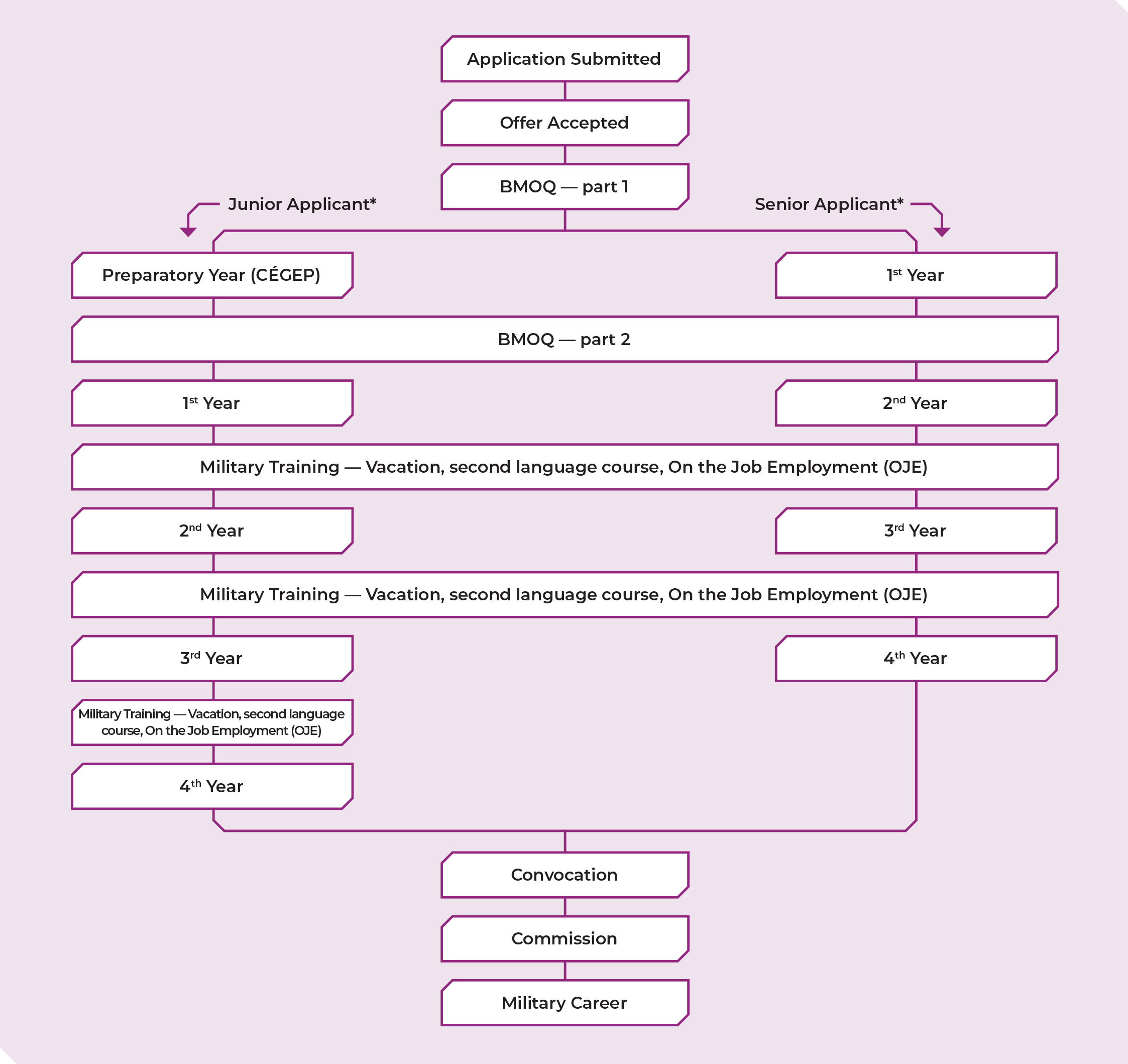
* The term “senior applicant" designates an applicant requiring four years of subsidized studies to obtain a university diploma. Seniors are mainly applicants from Quebec having completed one year of college studies (cégep 1) and those from other Canadian provinces who completed their high school studies (Grade 12). These applicants are admitted directly into First Year at either of the Canadian Military Colleges. To apply for Preparatory Year, you must hold or be on the verge of completing a high school diploma. If you are in grade 11, you can’t apply.
During the enrolment process, the term "junior applicant" designates an applicant requiring five years of subsidized studies to obtain a university degree. Juniors are mainly applicants from Quebec applying for Preparatory Year, equivalent to the first year of cégep studies (cégep 1) in the Quebec education system. Applicants from other Canadian provinces who are missing prerequisites to be admitted directly in first year could receive an enrolment offer as junior applicants and thus be granted five years of subsidized studies. To apply for Preparatory Year, you must hold or be on the verge of completing a high school diploma. A grade 11 student can’t apply as junior applicant.
